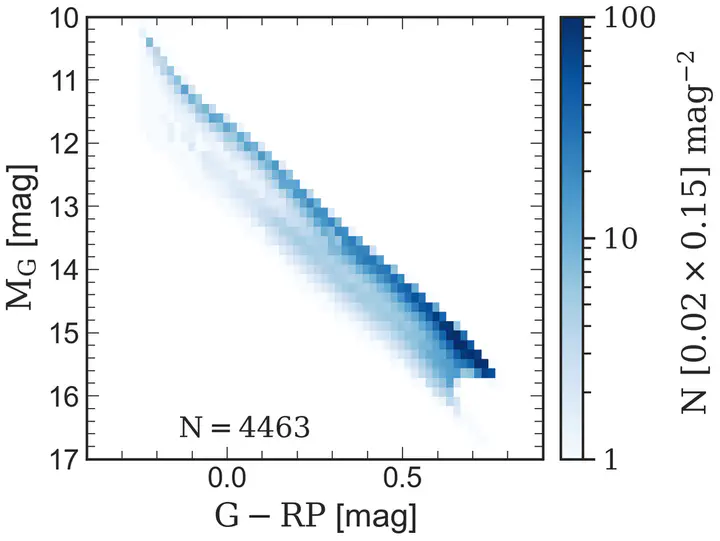Properties of White Dwarfs in the JJ model based on Gaia (E)DR3
 WD CMD generated by the JJ model
WD CMD generated by the JJ model
Abstract
The Just-Jahreiß (JJ) model is a semi-analytic chemo-dynamic model of the Milky Way (MW) Galactic disk (Just & Jahreiß 2010) and is a flexible tool for stellar population synthesis. It is based on an iterative solving approach of the Poisson-Boltzmann equation and reconstructs a self-consistent pair of the total vertical gravitational potential and density. This work deals with extending the JJ model to the WD locus. Currently, we use the initial-final mass relation by Cummings et al. (2018) to bridge the main sequence stellar evolution to WDs. We use solar metallicity BaSTI (Salaris et al. 2022) carbon-oxygen WD isochrones for H atmosphere (type DA) and He atmosphere (type DB) WDs to further evolve a given population in the JJ model. For simplification, we fix the ratio of DA to DB WDs to be 80 % to 20 % for all temperature ranges. To test the JJ model’s predictions, we use the CNS5 catalogue, a volume-limited sample of stars within 25 pc and a sub-sample of the GCNS catalogue with a volume of 60 pc. We use the default JJ model parameters, this includes two star formation bursts which happened 0.5 Gyrs and 3 Gyrs ago as defined in Sysoliatina & Just 2021. We also define a cut at 15 MG in the data to focus on the late SFR and thus young WDs. We find a good data-to-model consistency, with a discrepancy in the total star count being 1 % against the CNS5 and 3 % against the 60 pc volume sample. However, the model predicts 9 % more WDs than the data (for both samples). Most of these are located near 15 MG and suggests that the earlier SFR must be adapted. The model also predicts vertical density profile, W velocity profile, age and mass distributions of WDs. Currently, the model predicts a higher DA mass distribution peak at 0.61 M⊙. The next planned step is to calibrate the SFR based on old WDs in the solar neighbourhood and revisit these properties.